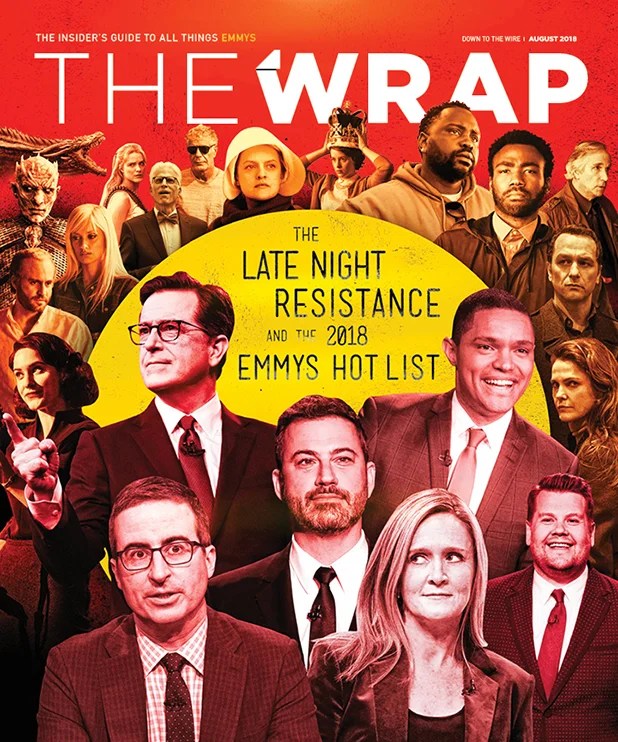A version of this story on Carrie Brownstein first appeared in the Down to the Wire issue of TheWrap’s Emmy magazine.
The sketch-comedy series “Portlandia” began with a series of comedy shorts made by actor-comedian Fred Armisen and musician Carrie Brownstein, one of the leaders of the pioneering all-female indie band Sleater-Kinney.
Over eight seasons that ended in March, the show turned into an Emmy favorite, landing its first nomination in 2011 and picking up Outstanding Variety Sketch Series nominations the last four years in a row.
Over the years, Brownstein directed four episodes, receiving her first directing nomination this year for the season opener, “Riot Spray.” In that episode, a former punk band reunites and finds that youthful anger has given way to more mundane middle-aged concerns.
What was shooting the final episode like?
Fred [Armisen] and I could see the end of the show on the horizon, but we kept putting it off. We would have recurring guest stars come on, and they would experience their own sense of finality and loss. And Fred and I would think, “Well, this is your last day.”
And then finally the day for our last scene arrived — and yeah, it was a little strange. It was hard to feel the totality of the moment, but there were definitely tears. You go into it thinking that there’s going to be some kind of stoicism, but when it actually happens there’s a sense of immediate devastation.
As you were approaching the end of the final season, did you have more ideas than you could fit in the remaining episodes?
In the writers’ room, it always feels like a lack of ideas. I didn’t have the sense of needing more until a couple of months ago. And then I realized that “Portlandia” was a way I processed phenomena. I’m used to gathering with intelligent, funny people and dealing with our crazy world — and not having that this year, I do feel like I want another season.
What was the biggest challenge in directing the episode you’re nominated for, “Riot Spray”?
The intimidation factor. We gathered a group of guest stars who hold a certain amount of cultural currency in the lives of Fred and myself, and they’re all these pillars of indie and alternative rock: Henry Rollins from Black Flag, Kris Novoselic from Nirvana, Brendan Canty from Fugazi …
We had these very powerful men, some of whom I’ve been admiring since I was a teenager. And when you’re a teenager, you feel very disempowered — so allowing myself to be the one who is in control on the set, despite the fact that part of me is looking at them through a teenage lens, was a mental challenge.
Being on the set directing, you need to feel powerful. So I had to just take a moment and say, “I’m fine. It’s OK.”
It’s not like you don’t have a little bit of indie-rock cred on your own.
Yeah, that’s true. I do have a little bit of indie-rock cred myself. But they’ve got a couple of years on me, and you’re always looking up to your mentors.
It certainly looked as if those guys got a real kick out of what they were doing in that episode.
Yeah. I think “Portlandia” became a kind of playground for people who audiences were accustomed to see take themselves very seriously. It was a context where they could have some self-awareness, some self-reflection and dissection, and almost play with their reputations. So yeah, none of these guys were afraid to examine what happens to rebellion when it merges with aging and the needs of oneself and one’s family. They were very game, which I loved.
I guess I’m not surprised by that anymore, because I saw it so often on “Portlandia,” but I’m always grateful when people are willing to make fun of themselves.
The Emmy directing categories have 40 male nominees and only four women this year. What’s wrong with that picture?
People assume that progress is inevitable, and it’s not. Progress is not a linear, upward trajectory, and it’s not something that can be a hobby — we can’t dabble in the betterment of society, we actually have to work at it.
We live in an unequal system, and we’ve been raised to value things that keep us unequal. We can’t just dismantle that with some news articles or a couple of meetings — it has to be an institutional shift, and those don’t happen overnight.
I think this is an important reminder, when we take a couple of steps forward and just as many steps back, that this can’t be a fad. It has to be a real, fundamental change.
See video from TheWrap’s interview with Carrie Brownstein above. To read more of the Down to the Wire issue, click here.

